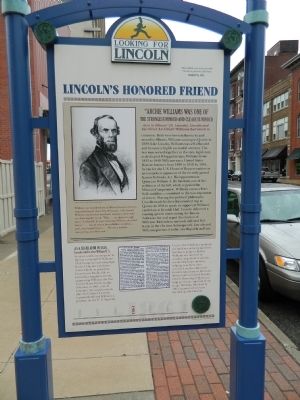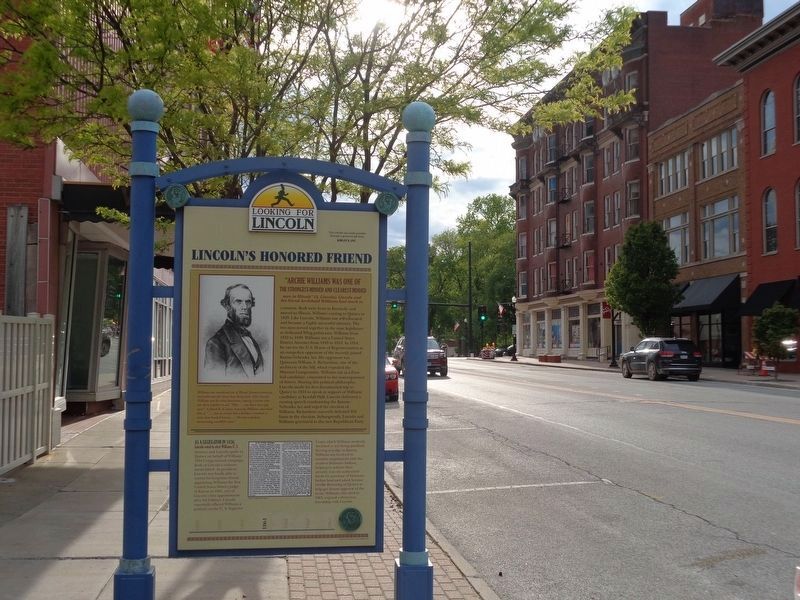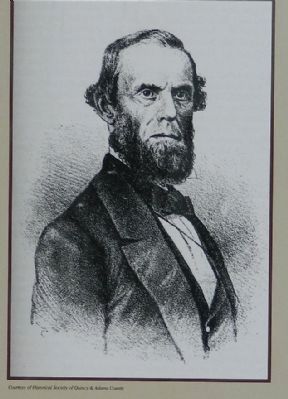Lincoln's Honored Friend
Looking for Lincoln
"Archie Williams was one of the strongest-minded and clearest-minded men in Illinois" (A. Lincoln). Lincoln and his friend Archibald Williams had much in common. Both were born in Kentucky and moved to Illinois. Williams coming to Quincy in 1829. Like Lincoln, Williams was self-educated and became a highly successful attorney. The two men served together in the state legislature as dedicated Whig politicians. Williams from 1832 to 1840. Williams was a United States District Attorney from 1849 to 1853. in 1854 he ran for the U.S. House of Representatives as an outspoken opponent of the recently passed Kansas-Nebraska Act. His opponent was Quincyan William A. Richardson, one of the architects of the bill, which repealed the Missouri Compromise. Williams ran as a Free-Soil candidate, committed to the non-expansion of slavery. Sharing this political philosophy, Lincoln made his first documented trip to Quincy in 1854 to speak in support of Williams' candidacy at Kendall Hall. Lincoln delivered a rousing speech condemning the Kansas-Nebraska Act and urged the election of Williams. Richardson narrowly defeated Williams in the election. Subsequently, Lincoln and Williams gravitated to the new Republican Party.
Williams was considered one of Illinois' foremost attorneys and politicians for more than thirty years. Like Lincoln, Williams was less than handsome, causing a visitor who saw them together to ask, "Who...are those two ugly men:" A friend k.K. Jones, honoring Williams described him as "...not an orator, but a thinker; a student, a cool, clear-headed lawyer....He was a modest, unassuming, unselfish man."
As a legislator in 1836 Lincoln voted to elect Williams U.S. Senator, and Lincoln spoke in Quincy on behalf of Williams' 1854 Congressional campaign. Both of Lincoln's endorsements failed. As president Lincoln was finally able to reward his long-time friend, appointing Williams the first United States District judge of Kansas in 1861, one of Lincoln's first appointments after his Cabinet. Lincoln reportedly offered Williams a position on the U.S. Supreme Court, which Williams modestly declined as not being qualified. Serving as judge in Kansas, Williams was involved in sensitive negotiations with the resident Delaware Indians, helping to achieve their security. Lincoln authorized funds for purchase of Delaware Indian land and asked Senator Orville Browning of Quincy to help get Senate approval of the treaty. Williams, who died in 1863, enjoyed a thirty-year friendship with Lincoln.
Erected by State of Illinois Historic Preservation Agency & Looking for Lincoln Heritage Coalition.
Topics and series. This historical marker
Location. 39° 55.91′ N, 91° 24.443′ W. Marker is in Quincy, Illinois, in Adams County. Marker is on Maine Street, on the right when traveling east. Touch for map. Marker is at or near this postal address: 516 Maine St, Quincy IL 62301, United States of America. Touch for directions.
Other nearby markers. At least 8 other markers are within walking distance of this marker. Lincoln's 1854 Visit (here, next to this marker); A Quincy "Copperhead" (about 300 feet away, measured in a direct line); Lincoln-Douglas Debate (about 400 feet away); Racial Equality (about 400 feet away); Political Campaigning in 1858 (about 400 feet away); Lorado Taft (1860 - 1936) (about 500 feet away); Morality of Slavery (about 500 feet away); Changing Slavery (about 500 feet away). Touch for a list and map of all markers in Quincy.
Credits. This page was last revised on September 2, 2020. It was originally submitted on August 26, 2012, by Bill Pfingsten of Bel Air, Maryland. This page has been viewed 577 times since then and 11 times this year. Photos: 1. submitted on August 26, 2012, by Bill Pfingsten of Bel Air, Maryland. 2. submitted on September 2, 2020, by Jason Voigt of Glen Carbon, Illinois. 3. submitted on August 26, 2012, by Bill Pfingsten of Bel Air, Maryland.


